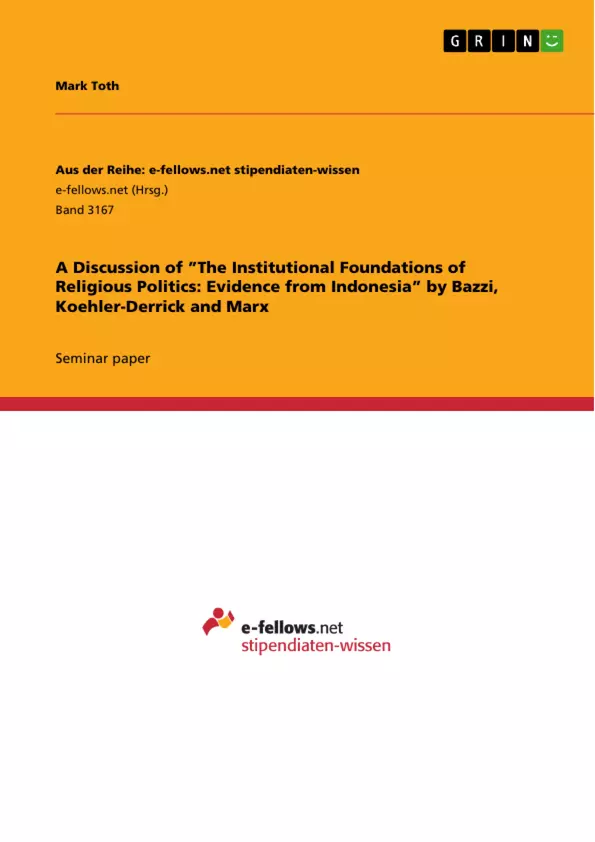This thesis discusses a paper about a natural historical experiment in Indonesia looking at the long-run effects of Islamic institutions on political Islamism. The authors use the definition of Islamism as a political movement which relies on fundamentalist Islamic values that it tries to implement into modern social and political life. The paper adds to the current research about the economics of religion which considers religion as an independent variable and looks at the influence of religion and its cultural implications on society, in this case the question how political outcomes are related to religion and religious institutions.
The foundation of the natural experiment is the Basic Agrarian Law (BAL) from 1960 during the era of president Sukarno. The goal of this reform was to reduce land inequality through expropriations of private landholdings. Nonetheless, religious properties were excluded, which had the effect that more people endowed Islamic lands called awqaf (singular: waqf). These properties are inalienable and used as sites for mosques and Islamic schools. The reform failed and was later reversed, but the newly created awqaf and the institutions located on them remained due to their religious status. Bazzi et al. argue that this has had a long-run effect on the support for political Islamism, since especially the Islamic schools influence local political views.
To test their hypotheses empirically, the authors apply an ”RDiD” design, which combines a Difference-in-Differences approach with a Regression Discontinuity design. The results show that the number of lands under waqf and the Islamic institutions situated on them indeed increased as a reaction to the land reform. Apart from the positive long-run effect on the support for political Islamism in districts which were targeted more intensely by the BAL, measured by looking at the voting results of elections in 1999 and 2009, the empirical analysis reveals a higher importance of candidates’ religion and religiosity as well as an increase in sharia (Islamic law) regulations in these regions.
Inhaltsverzeichnis (Table of Contents)
- Introduction
- Summary of the Paper
- Conceptual Framework
- Historical Background
- Theoretical Argument
- Empirical Framework
- Data
- Model
- Illustration
- Results
- Alternative Explanations
- Conceptual Framework
- Critical Discussion
- Pareto Estimator
- RDiD Design
- Conclusion
Zielsetzung und Themenschwerpunkte (Objectives and Key Themes)
This thesis examines a research paper analyzing the long-term effects of Islamic institutions on political Islamism in Indonesia. The paper explores the impact of the Basic Agrarian Law (BAL) from 1960, which aimed to reduce land inequality through expropriations, on the growth of awqaf (Islamic endowments) and their influence on local political views.
- The impact of Islamic institutions on political Islamism
- The role of the Basic Agrarian Law (BAL) in shaping religious landholdings
- The connection between awqaf, Islamic schools, and local political views
- The historical context and political dynamics of the Sukarno era in Indonesia
- The use of an "RDiD" design in empirical research
Zusammenfassung der Kapitel (Chapter Summaries)
- Introduction: The paper examines the long-term effects of Islamic institutions on political Islamism in Indonesia, using a natural historical experiment based on the Basic Agrarian Law (BAL) of 1960. This law aimed to reduce land inequality, but exempted religious properties, leading to an increase in awqaf. The authors argue that these awqaf, particularly Islamic schools, have influenced local political views.
- Summary of the Paper: This section outlines the conceptual framework, including the historical background of the BAL and its impact on awqaf. It also presents the empirical framework, which utilizes an "RDiD" design to analyze the data and assess the impact of the BAL on political Islamism.
- Conceptual Framework: This section delves into the historical context of the BAL, explaining its rationale and how it was implemented. It discusses the role of awqaf in Indonesian society and how they were influenced by the BAL. The section also explores the political dynamics of the time, including the relationship between the Sukarno regime, the Islamic elites, and the peasant movement.
- Empirical Framework: This section details the data sources and methods used in the study. It explains the "RDiD" design, which combines Difference-in-Differences and Regression Discontinuity approaches to assess the effects of the BAL. It also presents the results of the analysis, showing how awqaf and Islamic institutions have influenced political outcomes.
Schlüsselwörter (Keywords)
This work explores key themes such as political Islamism, religious institutions, awqaf, land reform, the Basic Agrarian Law (BAL), natural historical experiments, "RDiD" design, Difference-in-Differences, Regression Discontinuity, political outcomes, voting results, sharia regulations, and the historical context of Indonesia during the Sukarno era.
Frequently Asked Questions
What is the "Basic Agrarian Law" (BAL) of 1960?
The BAL was a reform initiated by President Sukarno to reduce land inequality through the expropriation of private landholdings. However, it exempted religious properties from these measures.
How did the BAL influence Islamic institutions in Indonesia?
Because religious lands were exempt from expropriation, many landowners endowed their property as "awqaf" (Islamic endowments) to protect them. This led to a significant increase in the number of mosques and Islamic schools.
What are "awqaf"?
Awqaf (singular: waqf) are inalienable religious endowments under Islamic law, typically used for communal or religious purposes like schools and mosques.
What is the long-term political effect of these institutions?
Research shows that districts with more awqaf and Islamic schools established during the reform era exhibit higher support for political Islamism and sharia regulations decades later.
What is the "RDiD" design mentioned in the study?
The "RDiD" design is an empirical research method that combines a Difference-in-Differences approach with a Regression Discontinuity design to test hypotheses about the long-run effects of the land reform.
- Citation du texte
- Mark Toth (Auteur), 2019, A Discussion of ”The Institutional Foundations of Religious Politics: Evidence from Indonesia” by Bazzi, Koehler-Derrick and Marx, Munich, GRIN Verlag, https://www.grin.com/document/491312



